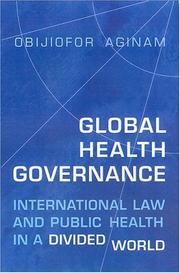| Listing 1 - 10 of 64 | << page >> |
Sort by
|
Book
ISBN: 9780262362344 0262363011 0262362341 9780262363013 0262363011 9780262045384 0262045389 Year: 2021 Publisher: Cambridge, Massachusetts : The MIT Press
Abstract | Keywords | Export | Availability | Bookmark
 Loading...
Loading...Choose an application
- Reference Manager
- EndNote
- RefWorks (Direct export to RefWorks)
"How mental disorders became comparable worldwide through the making of metrics, focussing on the WHO's first international social psychiatry project"--
Mental health --- Mental illness --- Social psychiatry. --- World health. --- International cooperation. --- Measurement. --- World Health Organization.
Book
ISBN: 0801464390 0801463920 9780801463921 9780801450655 0801450659 Year: 2012 Publisher: Ithaca, NY
Abstract | Keywords | Export | Availability | Bookmark
 Loading...
Loading...Choose an application
- Reference Manager
- EndNote
- RefWorks (Direct export to RefWorks)
Since 1948, the World Health Organization (WHO) has launched numerous programs aimed at improving health conditions around the globe, ranging from efforts to eradicate smallpox to education programs about the health risks of smoking. In setting global health priorities and carrying out initiatives, the WHO bureaucracy has faced the challenge of reconciling the preferences of a small minority of wealthy nations, who fund the organization, with the demands of poorer member countries, who hold the majority of votes. In The World Health Organization between North and South, Nitsan Chorev shows how the WHO bureaucracy has succeeded not only in avoiding having its agenda co-opted by either coalition of member states but also in reaching a consensus that fit the bureaucracy's own principles and interests. Chorev assesses the response of the WHO bureaucracy to member-state pressure in two particularly contentious moments: when during the 1970's and early 1980's developing countries forcefully called for a more equal international economic order, and when in the 1990's the United States and other wealthy countries demanded international organizations adopt neoliberal economic reforms. In analyzing these two periods, Chorev demonstrates how strategic maneuvering made it possible for a vulnerable bureaucracy to preserve a relatively autonomous agenda, promote a consistent set of values, and protect its interests in the face of challenges from developing and developed countries alike.
Public health --- World health. --- Global health --- International health --- Medical geography --- International agencies --- Medical assistance --- Public health laws, International --- World health --- International cooperation. --- International cooperation --- World Health Organization. --- Wereldgezondheidsorganisatie --- World health organization
Book
ISBN: 9780198705833 0198705832 Year: 2015 Publisher: New York (N.Y.) Oxford University Press
Abstract | Keywords | Export | Availability | Bookmark
 Loading...
Loading...Choose an application
- Reference Manager
- EndNote
- RefWorks (Direct export to RefWorks)
'International organization in time' investigates the effects of reform programs on international organizations (IOs). Drawing on insights from historical institutionalism and sociological organization theory, the book develops a theory of IO fragmentation to account for the centrifugal tendencies of the global polity. Focusing on the reform problems in the United Nations system in general and the World Health Organization in particular, the findings of 'International organization in time' not only advance scholarly understanding of institutional development beyond the state, but also raise important questions about the legitimacy of international organizations.
Book
ISBN: 9781108728843 9781108483575 1108483577 1108728847 9781108692878 1108692877 1108599265 1108626475 Year: 2019 Publisher: Cambridge : Cambridge University Press,
Abstract | Keywords | Export | Availability | Bookmark
 Loading...
Loading...Choose an application
- Reference Manager
- EndNote
- RefWorks (Direct export to RefWorks)
According to its Constitution, the mission of the World Health Organization (WHO) was nothing less than the 'attainment by all peoples of the highest possible level of health' without distinction of race, religion, political belief, economic status, or social condition. But how consistently and how well has the WHO pursued this mission since 1946? This comprehensive and engaging new history explores these questions by looking at its origins and its institutional antecedents, while also considering its contemporary and future roles. It examines how the WHO was shaped by the particular environments of the postwar period and the Cold War, the relative influence of the US and other approaches to healthcare, and its place alongside sometimes competing international bodies such as UNICEF, the World Bank, and the Gates Foundation. The authors re-evaluate the relative success and failure of critical WHO campaigns, from early malaria and smallpox eradication programs to struggles with Ebola today.
Global Health --- International Agencies --- Health Policy --- Health Services Administration --- Disease Eradication --- International Cooperation --- History, 20th Century --- History, 21st Century --- history --- World Health Organization. --- Global Health. --- History, 20th Century. --- History, 21st Century. --- history. --- World health. --- International agencies --- Medical policy --- Health services administration --- International cooperation --- History. --- World Health Organization --- Wereldgezondheidsorganisatie --- World health organization
Book
ISBN: 1299251536 0810878593 9780810878594 0810878585 9780810878587 Year: 2013 Publisher: Lanham, Md. Scarecrow Press
Abstract | Keywords | Export | Availability | Bookmark
 Loading...
Loading...Choose an application
- Reference Manager
- EndNote
- RefWorks (Direct export to RefWorks)
The Historical Dictionary of the World Health Organization covers the history of the WHO through a chronology, an introductory essay, appendixes, and an extensive bibliography. The dictionary section has over 1000 cross-referenced entries on key bodies, programs, events and people. This book is an excellent access point for students, researchers, and anyone wanting to know more about the World Health Organization.
Public health --- International cooperation. --- World Health Organization --- History --- History. --- Wereldgezondheidsorganisatie --- World health organization --- International agencies --- Medical assistance --- Public health laws, International --- World health --- International Agencies --- World Health --- organization & administration&delete& --- English --- History&delete& --- World Health Organization. --- E-books --- International Health --- Worldwide Health --- International Health Problems --- Health Problem, International --- Health Problems, International --- Health, Global --- Health, International --- Health, World --- Health, Worldwide --- Healths, International --- International Health Problem --- International Healths --- Problem, International Health --- Problems, International Health --- Agencies, International --- Agency, International --- International Agency --- history&delete& --- Dictionaries. --- organization & administration
Periodical
Abstract | Keywords | Export | Availability | Bookmark
 Loading...
Loading...Choose an application
- Reference Manager
- EndNote
- RefWorks (Direct export to RefWorks)
Medicine --- oncology --- gynecology --- urology --- surgery --- health organization --- Medicine. --- Clinical sciences --- Medical profession --- Human biology --- Life sciences --- Medical sciences --- Pathology --- Physicians --- Health Workforce

ISBN: 1280846887 0195345495 1429459484 9781429459488 9780195313673 0195313674 9781280846885 0197708498 Year: 2007 Publisher: Oxford New York Oxford University Press
Abstract | Keywords | Export | Availability | Bookmark
 Loading...
Loading...Choose an application
- Reference Manager
- EndNote
- RefWorks (Direct export to RefWorks)
In the late 1960's, the World Health Organization initiated a series of international studies of the incidence, characteristics, course, and consequences of schizophrenia. Those studies - the largest ever in the history of psychiatry - provided important data about the disorder in groups of patients living in different countries and cultures, and first focused attention on the differences in short-term prognosis for schizophrenia between the third world and industrialized countries. In the 1990's, the International Study of Schizophrenia (ISoS) set out to relocate those subjects and to determine
Schizophrenia --- Psychoses. --- Psychosis --- Psychotic disorders --- Psychology, Pathological --- Dementia praecox --- Schizophrenic disorders --- Psychoses --- Schizotypal personality disorder --- Epidemiology. --- World Health Organization. --- Follow-Up Studies. --- International Cooperation. --- Treatment Outcome. --- therapy.
Book
ISBN: 9283221036 Year: 1990 Volume: vol 103 Publisher: Lyon IARC
Abstract | Keywords | Export | Availability | Bookmark
 Loading...
Loading...Choose an application
- Reference Manager
- EndNote
- RefWorks (Direct export to RefWorks)
Hygiene. Public health. Protection --- Oncology. Neoplasms --- Cancer --- -Kanker --- Preventieve geneeskunde --- Cancers --- Carcinoma --- Malignancy (Cancer) --- Malignant tumors --- Tumors --- Prevention --- Médecine préventive --- Prevention. --- Kanker --- Primary prevention --- Effectiveness --- NEOPLASMS --- PRIMARY PREVENTION --- LIFE STYLE --- ENVIRONMENTAL EXPOSURE --- WORLD HEALTH ORGANIZATION --- PREVENTION AND CONTROL --- EPIDEMIOLOGY

ISBN: 1281997730 9786611997731 1442675373 9781442675377 9781281997739 0802080006 9780802080004 1442654228 Year: 2005 Publisher: Toronto
Abstract | Keywords | Export | Availability | Bookmark
 Loading...
Loading...Choose an application
- Reference Manager
- EndNote
- RefWorks (Direct export to RefWorks)
Globalization has immersed all of humanity in a single germ pool. There are no health sanctuaries in a globalizing world. InGlobal Health Governance, Obijiofor Aginam explores the relevance of international law in contemporary public health diplomacy. He focuses on the concept of mutual vulnerability to explore the globalization of disease, in what is paradoxically a global village and a divided world. Drawing from a wide range of disciplines, Global Health Governance offers a holistic approach to global health governance involving a multiplicity of actors: nation-states, international organizations, civil society organizations, and private actors. Aginam articulates modest proposals under the rubric of communitarian globalism, a paradigm that strives to meet the ideals of 'law of humanity.' These proposals project a humane global health order where all of humanity is inexorably tied into a global compact and where the health of one nation-state rises and falls with the health of others. International law - with its bold claims to universal protection of human rights and human dignity - is an indispensable governance tool for the reconstruction of damaged public health trust in the relations of nations and peoples.
Public health laws. --- Public health laws, International. --- International public health laws --- International sanitary regulations --- World health --- International law --- Communicable diseases --- Public health --- Medical laws and legislation --- Law and legislation --- Gezondheidszorg. --- World Health Organization --- World Bank

ISBN: 0415077923 0415077915 9780415077927 Year: 1993 Publisher: London Routledge
Abstract | Keywords | Export | Availability | Bookmark
 Loading...
Loading...Choose an application
- Reference Manager
- EndNote
- RefWorks (Direct export to RefWorks)
Urban health --- Research. --- Planning. --- #SBIB:316.334.3M50 --- 364.26 --- Organisatie van de gezondheidszorg: algemeen, beleid --- Maatschappeljke problemen met hygiene en gezondheid --- 364.26 Maatschappeljke problemen met hygiene en gezondheid --- Hygiene. Public health. Protection --- Sociology of health --- WHO Healthy Cities Project. --- City health --- Urban public health --- Urbanization --- Public health --- Planning --- Research --- Health aspects --- Healthy Cities Project (World Health Organization) --- World Health Organization. --- Urban health - Research. --- Urban health - Planning.
| Listing 1 - 10 of 64 | << page >> |
Sort by
|

 Search
Search Feedback
Feedback About UniCat
About UniCat  Help
Help News
News